In blocking a vote on a transportation package before the Washington State Legislature adjourned this weekend, Senate Republicans led by Rodney Tom utterly failed anyone who rides the bus—or drives through or around—King County. There was plenty not to like about the transportation bill, but one important piece would have given King County Metro the option of raising new and needed revenue through a local motor vehicle excise tax.
Now that that’s dead, the agency plans to go about systematically cutting up to 17 percent of its service hours over the next two years. Just think about that. It is, quite plainly, insane. For a region with employers eager to attract car-averse Millennials or who depend on service workers who travel from cheaper and more diverse suburbs, such deep transit cuts will disrupt business as usual and make it impossible for some of those employees to keep their jobs.
And who imagines the city of Seattle can come close to meeting its climate goals (like becoming carbon neutral by 2050) if we not only stop making investments in services that get cars off the road, but actively start dismantling that system at a time when we should be expanding it just to keep up with population growth?
So what’s now on the table to help backfill Metro’s immediate $75 million budget hole? Eliminating roughly one-third of Metro’s routes and reducing service on another 40 percent of routes. The remaining one-third of high-volume routes that don’t get cut will become more crowded. These cuts will be painful for the vast majority of people who rely on Metro. And for those who don’t, now your roads will be clogged with cars driven by people who once took the bus but gave up on it because it either never comes anymore or is too crowded when it does. I’ve directed people to this neighborhood-by-neighborhood map outlining the potential cuts before, but I’ll do it again, because it’s astonishing.
Tom et al. say they’ll work on an alternative transportation package to put before state voters in the fall of 2014 (which presumably might contain new funding for Metro in order to convince King County voters here to support all the other terrible ideas in it). But by then Metro will already be well into the process of identifying and eliminating routes and service.
So get ready, King County. This is what happens when the state’s voters eliminate stable funding sources for important services. Let’s see how we like it.

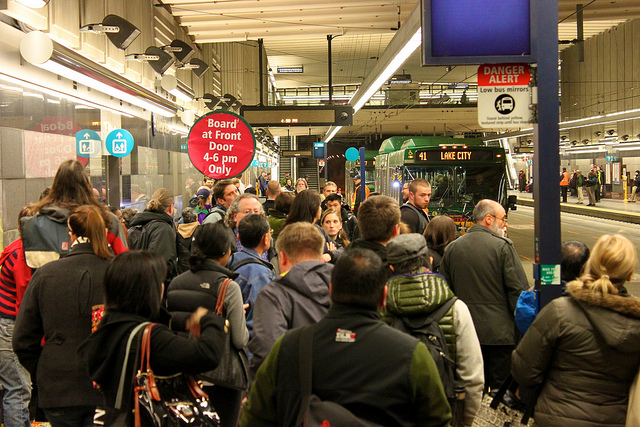
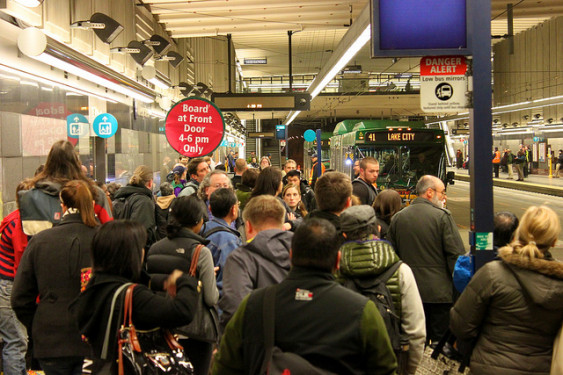

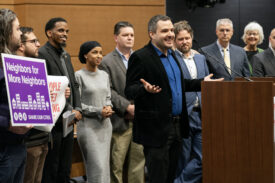
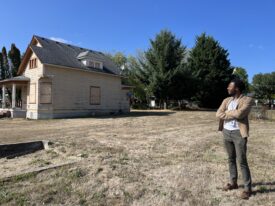
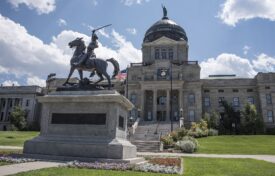


beth
you really think that attract car-averse Millennials can’t find other ways of getting around? your political spin doesn’t sell. if metro ran a tighter “ship” it wouldn’t have to cut any further. nothing but government waste and i’m glad olympia is listening.
SFIII
Metro has been doing a lot to both streamline and improve bus service in the last year. This turn of events is disappointing. Metro, like all government agencies, is not likely the most efficient organization in the world, but I’d rather that an agency that offers essential public services is a little fat than a little too skinny.
Not sure what Beth is implying with “other ways of getting around.” Does she mean bikes? As a cyclist, I bike unless, well, I need to take the bus. Buses extend the range of cyclists. So I guess I’m assuming that Beth is implying that we all should be driving, and creating more of a traffic jam that she will have to sit in for longer and longer periods of time, increasing her asthmatic condition from all the air pollution, with all the inactivity of sitting in the car contributing to those chubby spots under her arms and gluts. Go Beth. Great idea!!! Way to fight global warming!! Or maybe she’s implying that we should all walk. In that case, kudos to you Beth for being such a radical idealist! We can all only dream of following in your footsteps some day (no pun intended).
Ed Hill
What sense does it make to fund a service that removes vehicles from the roads by increasing a fee for those vehicles? Logic would dictate that as people stop using cars to ride the bus, the very funding source that Metro is depending on would dry up. Raising money through and excise tax is not a solution, it is a way to delay the inevitable. What needs to happen is a more permanent, steady funding source be identified. With all the funding shortfalls around the state, I can’t understand the aversion to a state income tax.
As a homeowner, I get tired of my property taxes increasing whenever the state or city needs more money. Now they want to increase the tax on my vehicles; I’m glad it failed. Someone should take a survey to define the average bus rider; do they own a home or rent? Do they have a vehicle at their disposal? What is the average income? Once that information is available, find a way to tap those that benefit most from the service and can afford it for some extra funds.
SFIII
Ed, that same logic applies to gambling and education, and alcohol tax vs food (non-taxed).
By your own logic, we should not tax gamblers because then eventually there will be fewer and fewer gamblers and education will suffer. Or we should not tax alcohol because then it will discourage drinking and our state government services will be reduced. Habits are taxable. It’s a smart way to do it. It’s been done before. Parking meters. Check. Taxes going up on gasoline. Check. Toll bridges. Check.
That’s because DRIVING A SINGLE PASSENGER VEHICLE IS ESSENTIALLY AN EGOTISTICAL ACT. It is resource-intensive and drains wealth and usable space from the collective.
I don’t feel that property taxes figure into this discussion at all and should be another discussion entirely. Taxing drivers is only rational, because driving is a choice, and a destructive one at that, fueling wars of great suffering, being the number one source of air and water pollution in the U.S., causing enormous sprawl in settlements, and fundamental to the dissolution of community. On the contrary, not living inside some sort of structure is not really a reasonable option for most people.
Jack Comber
The fact is the city and state are broke and they refuse to cut back on spending because this is where they derive their power. Just look at all the nonsense spending the city is doing. The cost of being mommy government is not sustainable, people need to start taking personal responsibility for them selves and stop looking for hand-outs. We the tax payers are tired of taking care of everyone else when our own self funded retirements and families are in need of a cash infusion. All we have to do is look to Europe and its clear that socialism and government bloating is the death nail to a society. And taking more through an income tax will only encourage them into more abysmal spending projects.
SFIII
Apparently Jack, you haven’t been to Europe lately. I just spent the last 2 years in France, Switzerland, Sweden, Italy. They’re doing better than the U.S. They’re working less than Americans, less stressed than Americans, have better access to health care, and their currency is stronger in relationship to ours, meaning that it is cheap for them to travel to the U.S. and expensive for us to go there. Oh, and there’s WAAY less violence. To me, that’s worth a lot, even if it isn’t easy to translate that into dollars.
Janice Moorhead
There are many people who don’t have other transportation options, elderly people, people with developmental or physical disabilities who cannot drive and may have no families or support systems. They depend on transportation to go to church, to shop, attend social events, visit family who cannot visit them, (elderly parents & children who cannot visit them, etc.) We need to continue to care for these people. Of all the things to cut, really shameful.
Tom
Your point is well taken and local government should make allowances for the (not-so-well-off) elderly (not every Tom, Dick, Jane and June over 60) and definitely those with physical or other limitations.
BUT, HOWEVER, NONETHELESS, that is NO reason to go on another King County or Seattle City taxing rampage like they often want to do. I am fed up and tired of my property and car taxes being sucked up by local officials to pay for a stadium full of bus riders who are better off financially than me, and who are making more than my retirement. RAISE the user fee for all these riders or cut those bus runs … SIMPLE! DO NOT TAX me to SUBSIDIZE these riders. That is socialism, communism, and blood sucking un-American.
Judy
In Sept 2012 Metro decided to go to Rapid Transit to cut costs….but they only caused more usage of cars as in most areas of Seattle the trip would involve two additional transfers for the original trip so driving to this bus saves time and is safer as these transfers involve isolated dark bus stops….
Hope
I’m finding all these comments shortsighted. Often enough, an up-front cost (tax) is FAR cheaper than the alternative. I just spent 3 years using Metro exclusively, and was tipped off that the current level of service is what Metro was funded at in the 1980s” with significantly less development/population. I was urged to consider at least getting a scooter.
If all the people on the bus, simply commuting to/from work daily were on scooters, we would NOT all be happy. We’d be paying significantly more for first responders, and we’d all be sitting at traffic lights a lot more, and those with no/minimal health insurance would be costing those with health insurance more as free riders. And our roads would at times resemble bits of the developing world. That is NOT counting the disabled or elderly.
Trying to work and go to school while using the bus was a very rigorous exercise. I am in my 40s. Millennials are not — but a lot of them are doing the same thing, at similar rates of pay AND housing. They are NOT going to get ahead this way. I ended up scraping together enough money to get a beater car, which was NOT fuel efficient, leaked oil terribly, and have a blue plume coming out the tailpile as it started up. Ick! All kinds of beater cars may find themselves pressed into heavy service, even shared.
There are several car-share groups that have developed over the last several years. Lyft is one, there’s at least 2 others where you let out your car: I have NO IDEA how liability works. I can imagine a behind-cost in legal and medical fees as we figure that out, societally. Better to just have decent public transportation and a few outright rental programs. I was tempted to involve myself in such a group, and then realized I simply oculd not afford to, financially, not really understanding what my liability may be.
I have gotten myriad rides from friends to make it to appointments that were otherwise impossible to get to (Ballard to Madison Park, say, for a 1/2h to :45 appt. Half of your day will be expended.) I found myself commuting to Tukwila from Shoreline over a christmas season on Sundays, and discovered the only way to do so with the bus would involve a full hour ‘layover’ between 7 and 8a. And nearly 2 hours commuting, each way. Happily, I had friends who, on being invited to have breakfast and asked to give me a ride downtown, graciously volunteered to take me the entire way.
My father’s caregivers were nearly exclusively bus users. When buses did not show up on time, my household suffered, and my worklife did, as well. Maintaining a car on the typical wages of caregivers and retail workers, is simply prohibitive. As is, on my inspection, the social cost of NOT having viable public transportation options that allow honest folks to get around for AT LEAST work.
What happened to the Interurban? Ever see the plaque on the Interurban building downtown?
It’s not reasonable to expect everyone to own and maintain a vehicle, and it’s VERY sensible to NOT WANT THEM TO. It’s also sensible to pay for the privilege of NOT BEING INCONVENIENCED. If you ever need a caregiver at your door in the morning, and you don’t have a relative who can pick them up on the other side of town; if you’d prefer to not be delayed in traffic by accidents or light/congestion delays; if air and water quality are worth protecting, up-front; if you want the day-worker to bget to your job in the morning NOT EXHAUSTED ALREADY from the effort of getting to your worksite — then, it makes sense to levy a tax and pay it. And decide what is fair.
SFIII
Agreed. Anybody who wants to see what it is like to live in a city without transit can read up on the current BART strike in San Francisco. Commuters forced back into their cars are choking the highways and commute times have doubled and tripled.
I guess that’s what all these drivers want on this forum is to share the road with 20% more drivers than before. As if traffic isn’t bad enough in Seattle. Geez.
DaveK
Sorry, but the local MVET was a no-go from about the third or fourth week of the session. The best Metro could or can hope for is likely an extension of the $20 per vehicle congestion fee for two more years.
Eric Hutcheson
Rodney Tom needs to be voted out of office come next election!
Car-less in Seattle
I agree, Eric. But I think that Sightline by its Charter may not endorse or oppose candidates in a partisan election.
However, if folks want to become active before the next election, the Transit Riders Union, which seeks to protect public transportation in King County against political attacks, plans a demonstration near the King County Courthouse on July 20 (Saturday). The link to the TRU’s web pages, with details on the event, and further links to the group’s Facebook page, can be found here: http://transitriders.org/
and here: https://www.facebook.com/events/527262290662324/
I should report that I am not a member of the Transit Riders Union, and the comments here are my own, and not the responsibility of the TRU, nor Sightline. But if folks cannot attend the July 20 rally, then via the TRU’s web link above, they can draft a letter to Mr. Tom, expressing their disappointment at the WA Senate’s decision to vote on behalf of exremism and against public transit. I believe the plan is to deliver the assembled messages to Mr. Tom’s office in Medina by bus, if there is one that actually stops in Medina (a neighborhood with multi-millionaires, at least).
The Transit Riders Union Facebook page, link again above, also mentions a general meeting on July 23, Tues, at the Labor Temple (2800 First Avenue, Seattle), to discuss what King County and other governments can do to preserve Metro services in the face of the Senate’s obstructionism.
Oh, and the theme of the July 20 rally is Where’s The Funding; acronym withheld because the Daily is a family blog, after all.
Car-less in Seattle
To follow up on this post, the Where’s The Funding, Olympia? rally was postponed to July 27 (the July 20 date conflicted with Trayvon Martin rallies, so the Transit Riders Union moved their rally out of respect).
I recognize there are a range of opinions on this post, in addition to Jennifer’s. But for folks who might want to see the arguments for a strong Metro, and some background on why the WA Senate “coup” was responsible for a potential 17% cut in Metro services, a video from the rally was posted, dated July 31, at https://www.facebook.com/SeattleTRU.
There are 11 videos on that page, and viewers have to wait for one to complete (or scroll to the end of one speaker) before the next one starts. Speakers represented a range of interests, including elected officials and/or candidates.
I invite commenters to this post to watch the speakers explain why public transit is important for cities throughout the region and state.
I hope folks find these videos educational.
Sophie
Mayor what in the world are you thinking with your bike lanes, they a danger to public safety in Seattle, a waste of money, and they create more traffic.
We need a new Mayor someone like me.
Katherine Wiles
You are so right it’s a danger to the bike riders to share lanes with vehicles. Imagine how the vehicle drivers feel when they collide with a bike. If they want bikes on the road with vehicles they should have a dedicated lane, pay part of the taxes and be expected to follow rules of the road.
I see more bikes than not weaving in and out of traffic, jumping unto the sidewalks when vehicles are delaying their travels. These are dangerous practices and need to be ticketed as a vehicle would be if it drove down the sidewalk until it found an opening.
Special interest groups run this city as evidenced below. Seattle needs to pay attention and rally against these interests, especially when the planning is so short sighted.
Mr. Ayers is the executive director of Cascade Bicycle Club, a 13,000-member nonprofit organization that strives for more livable communities by promoting health, recreation, and non-motorized transportation through bicycle activities.
I own my own home and 32 years ago bought what I could afford. My taxes have went from low $2,000.00 to high $5,000.00. When I retire this means I will need to have $500.00 a month just to pay my taxes. Many seniors are getting taxed out of their homes. I want to contribute to my community so I suggest if you don’t own a home and vote it comes out of your paycheck as it does mine.
MCM
I agree with the comment that funding public transit by an excise tax on motor vehicles is unfair and unsustainable. I think it amounts to a subsidy of those who either choose not to own vehicles or who choose to use transit.
To have a vibrant public transit system these folks need to have some skin in the game beyond the fare they pay. This means funding transit by broader based taxes such as sales, property or income taxes.
And let’s face it motorists will vote down bloated motor vehicle excise taxes.
Its time to start seeing that public transit has to be publicly supported in the full sense of that phrase.